Battle of Crete. Why Hitler abandoned a further offensive in the Mediterranean
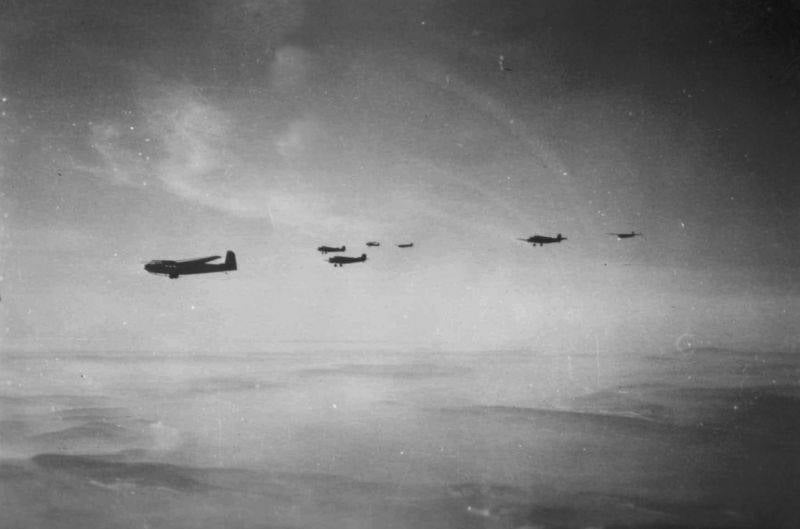
German transport aircraft Junkers Y. 52 towing gliders DFS 230 during the first day of the operation "Mercury"
The results of the two waves of the Cretan landing were disastrous. Many commanders were killed, wounded or captured. The German landing suffered heavy losses. We did not complete any of the tasks. All objects remained behind the enemy. There were almost no heavy weapons, the ammunition was running out. Weary, wounded paratroopers were preparing for the last battle. There was no connection.
Plan of operation
The attack on the island was planned for May 20, 1941. The 11th Air Corps was to carry out a simultaneous landing at several points on the island. Although there were many planes, they were not enough to carry out a simultaneous landing. Therefore, it was decided to attack in three waves.
The first wave at 7 am (parachute and glider landing) included the "West" group - a separate airborne regiment of General Meindel. The paratroopers were supposed to capture Maleme airport and the approaches to it. This airfield was to become the main landing site for the German troops. Colonel Heydrich's 3rd paratrooper regiment was tasked with capturing the port of Souda and the city of Chania (Kania), where the British headquarters and the residence of the Greek king were.
The second wave at 13 o'clock in the afternoon included the "Center" group - the 1st paratrooper regiment of Colonel Brower. This group was supposed to capture Heraklion and the local airport. Group Vostok, Colonel Sturm's 2nd Airborne Regiment, attacked Rethymno.
It was believed that after the capture of these points, the third wave would begin in the evening - the landing of soldiers of the 5th Mountain Rifle Division, heavy weapons and equipment from aircraft and ships. The air force at this time was supposed to attack the allied garrison and paralyze the actions of the powerful British fleet.
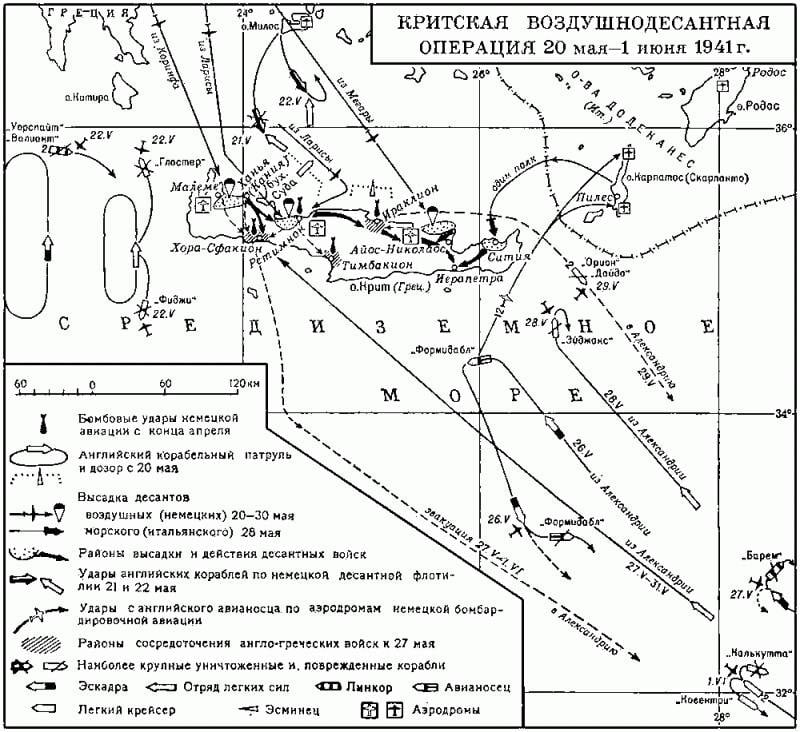
First wave
In the early morning, the Luftwaffe struck enemy positions. But the positions of the allies were well camouflaged and survived. Air defense means did not open fire and did not give themselves up. Gliders and junkers with parachutists arrived half an hour after the bombing. It was hot, bombers and attack aircraft raised a cloud of dust. The planes had to wait. It was not possible to land immediately, on the move. This pause had a negative impact on the operation.
At 7 o'clock 25 min. the first detachment of Captain Altman - the 2nd company of the 1st battalion of the airborne assault regiment, began the landing. The paratroopers came under heavy fire. Gliders were shot, they fell apart, crashed and fell into the sea. The Germans desperately maneuvered, used any suitable sites, roads to land.
Some gliders were shot already on the ground. The landed German paratroopers fiercely attacked the enemy. Most were armed only with grenades and pistols. The allies unleashed mortar and machine-gun fire on the enemy. It was not possible to take the airfield on the move. The New Zealanders threw back the enemy in a stubborn battle. The Germans captured only the bridge and part of the position to the west of the airfield. Altman has 108 soldiers out of 28.
The 1st battalion landing next also ran into heavy fire, many of the soldiers were killed while in the air. The battalion commander, Major Koch, and many other soldiers were wounded. The 1st Company captured the enemy battery, but lost 60 of the 90 soldiers. The 4th company and battalion headquarters landed directly on the New Zealanders' positions and were completely destroyed. It was a real massacre. The 3rd company was able to eliminate the air defense positions south of the object. This helped to avoid losses aviation upon further disembarkation. The Germans also captured anti-aircraft guns and with their help threw back enemy reinforcements.
Fierce fighting in the Malem area continued. Due to reconnaissance errors, part of the landing was thrown directly over the enemy's positions. Paratroopers of the 3rd battalion were parachuted northeast of the airport at the position of the New Zealand brigade. Almost all of the German paratroopers were killed. The 4th battalion with the regiment's headquarters landed to the west successfully, lost few people and established itself at the airfield. But the commander of the group, General Mendel, was seriously wounded. The paratroopers were led by the commander of the 2nd battalion, Major Stenzler. The 2nd battalion suffered heavy losses during the landing. One reinforced platoon landed among the Greek positions, almost all were killed. Some of the German soldiers were killed by local militias. The fierce battle continued all day. Some positions changed hands several times. The German paratroopers were gradually able to unite the landed groups and entrenched themselves north of the airfield.
Events developed in a similar way in the area of the landing of the 3rd regiment of Colonel Heydrich. At the very beginning, the division headquarters with the commander of the 7th air division, Lieutenant General Wilhelm Suessman, was killed. The 3rd battalion, which landed by the first, got into the positions of the New Zealanders and was completely defeated. Many were killed while in the air. The rest were finished off or captured on the ground. Due to an error, some units were thrown over the rocks, they crashed, broke their limbs and went out of action. One company was carried out to sea, the soldiers were drowned. A mortar company was thrown over the reservoir, the soldiers drowned. Only the 9th company landed safely and took up defensive positions. The disembarkation lasted all day. The Germans were widely scattered, trying to unite and find containers with weapons and ammunition. They suffered heavy losses.
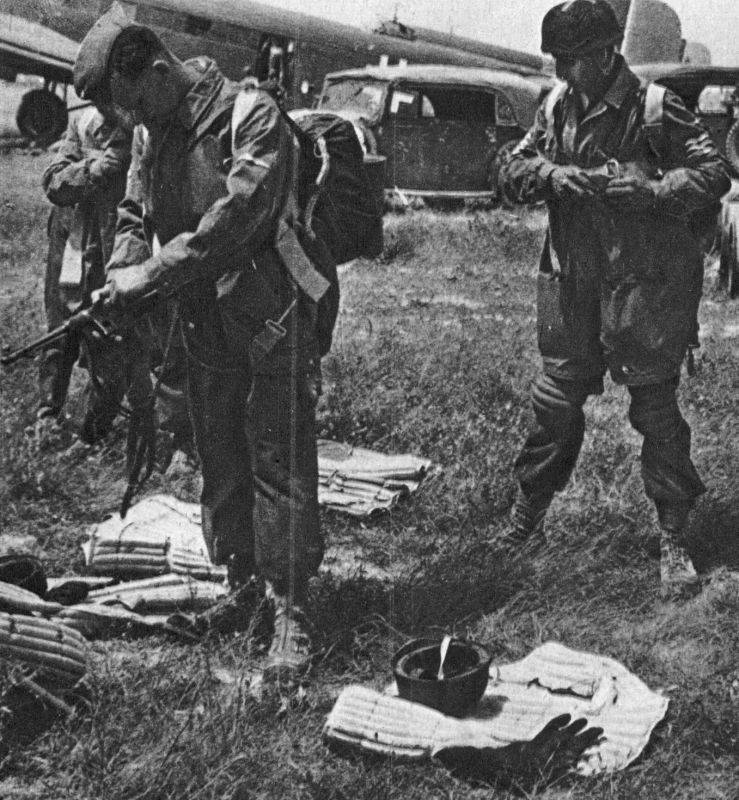
German paratroopers making final preparations before boarding a transport plane
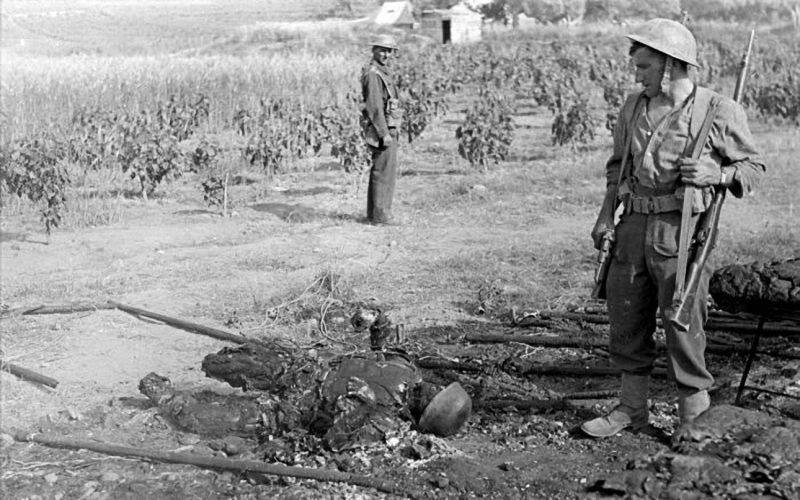
Burnt-out German parachutist. Nearby is an English soldier with a captured P.08 Luger pistol
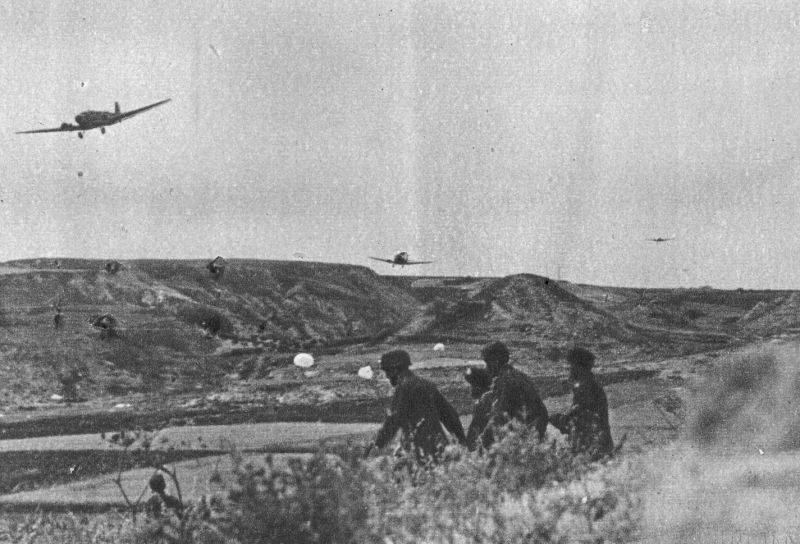
German paratroopers and Junkers Ju-52 transport planes flying over them in the area of altitude 107 in Crete. Hill 107 in the Maleme airfield area was one of the most important strongholds of the Allies, over which fierce battles were fought. On May 21, the height was captured by the Germans.
Second wave
The German command did not know about the disastrous start of the operation. It is possible that if it had a complete picture of what happened, the operation was either postponed or would have been canceled. But the German commanders decided that everything was going well. Of the 500 aircraft that took part in the first wave, only a few were lost. The German pilots did not see what was happening on the ground. Therefore, the headquarters of the 12th Army gave the go-ahead for the continuation of the attack.
Things went even worse than in the morning. Refueling problems and clouds of dust interfered with aviation operations. It was not possible to form a dense wave, the aircraft flew in small groups and at large intervals. The paratroopers had to land without aviation support, in small groups and with a large dispersion. The allies have already come to their senses. We realized that the main threat was not from the sea, but from the air. And they were ready to meet the enemy. All convenient landing sites were blocked and shot.
The 2nd regiment was thrown out in the Rethymnon area with a great delay - 16 hours. 15 minutes. Only two companies were landed after an air raid, the third was carried several kilometers to the side. The landing was delayed, and the Nazis suffered heavy losses. The Australians met the enemy with dense fire. The 2nd battalion was able to capture one of the commanding heights and tried to develop an offensive, to take other positions at the airfield. But the German paratroopers were met with strong fire from other heights and from the armored vehicles available here. The Germans retreated. Gathering the soldiers scattered around the area at night, the battalion repeated the attack, but was again driven back. The paratroopers suffered heavy losses; by the evening, 400 soldiers had left. The group commander, Colonel Shturm, was captured.
In the area of the landing of the 1st regiment, the situation was even worse. The landing force was thrown out even later, at 17 o'clock. 30 minutes. The bombers had already left, there was no air support. Part of the regiment was thrown out in Maleme. Heraklion had the strongest air defense, so the paratroopers jumped from great heights. This increased airborne losses. The landers came under heavy fire from enemy artillery and tanks... It was a massacre. Two companies were killed almost entirely. The rest of the units were scattered. And only the onset of darkness saved the Germans from complete destruction. The commander of the "Center" group, Brower, refuses to further suicide attacks, focuses on the collection of the remaining soldiers and on the search for containers with weapons. The Germans were entrenched on the road to Chania.
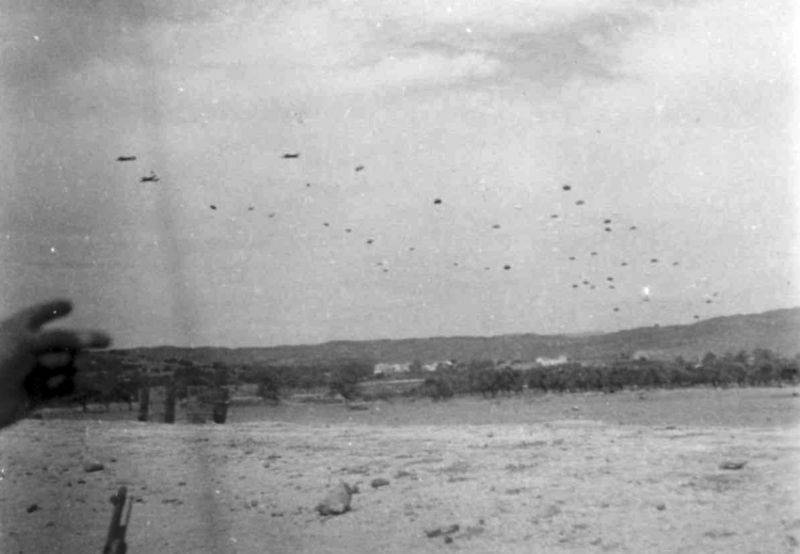
The second wave of German paratroopers of the "Mars" group from the 7th Airborne Division is landing east of the city of Rethymno. The task of the "Mars" (Center) group under the command of General Süsmann included the capture of the cities of Chania and Rethymno
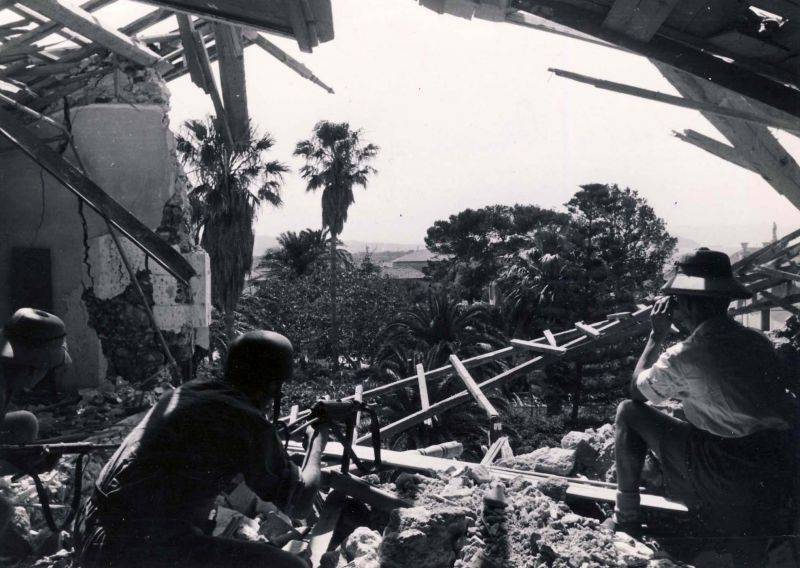
German parachutists are fighting in the city of Chania
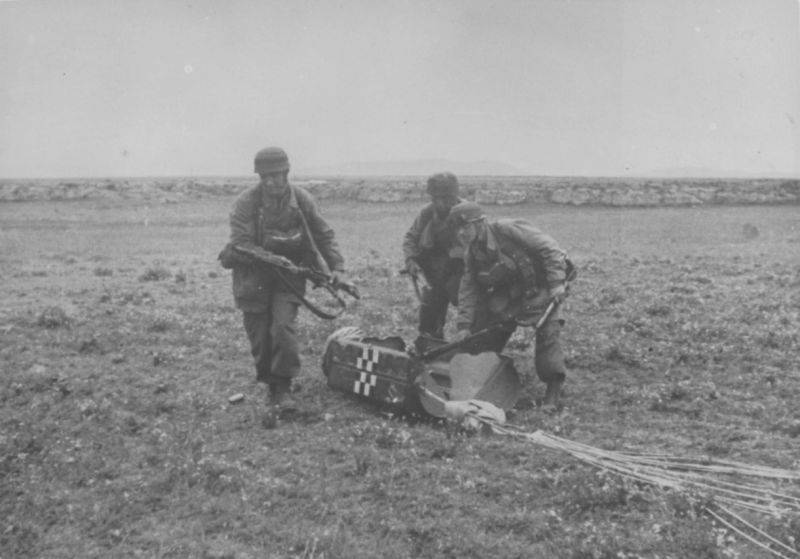
Three German paratroopers remove weapons from a container after landing in Crete
Failed disaster
The results of the two waves of the landing were disastrous. Many commanders were killed, wounded or captured. The landing party suffered heavy losses. Of the 10 thousand parachutists who landed, about 6 thousand fighters remained in the ranks. None of the tasks were completed. All objects were left behind the enemy. They did not capture a single airfield and could not land the 5th Mountain Rifle Division, which was airlifted on transport aircraft. There were almost no heavy weapons, the ammunition was running out. Weary, wounded paratroopers were preparing for the last battle. There was no communication, the radios were broken during the landing. The pilots could not give a clear picture of the battle. The command in Athens did not know about the catastrophe, about the fact that the landing was almost defeated.
The German landing was saved by two factors. First, the high combat quality of the German Airborne Forces. Even in the conditions of the death of headquarters and the dropout of commanders, the remaining officers did not lose heart, they acted independently and proactively. They created nodes of defense, attacked the superior forces of the enemy, imposed a battle on him, did not allow him to seize the initiative. The German paratroopers fought desperately, hoping that the neighbors were more fortunate, and that help would soon come. At night, they did not slow down, attacked, looked for their own people and containers with weapons.
Secondly, the Germans were saved by the mistakes of the Allies. The British had complete superiority in forces and weapons, they could throw all available forces against the enemy and finish it off. However, the allied command decided to keep the troops, waiting for the landing of the main enemy forces from the sea. The landing of the amphibious assault was expected in the area of Chania and Suda. As a result, the chance to defeat the airborne assault was lost. The British bided their time, conserving reserves, instead of crushing the enemy's main hearth in the Malem area.
The allies also had their own problems: they did not know the situation as a whole, there were not enough communications equipment, there were almost no armored vehicles for organizing a counteroffensive, transport for the transfer of reinforcements, and air support. Many soldiers had poor training and hardening, fought poorly, were afraid to attack. But the main thing was that the allied command gave the enemy the initiative, did not use their trump cards to destroy the German landing before the arrival of reinforcements. The allies undertook only private counterattacks, which the Germans were able to repulse, and did not enter the nearby reserves into battle, fearing an amphibious landing.
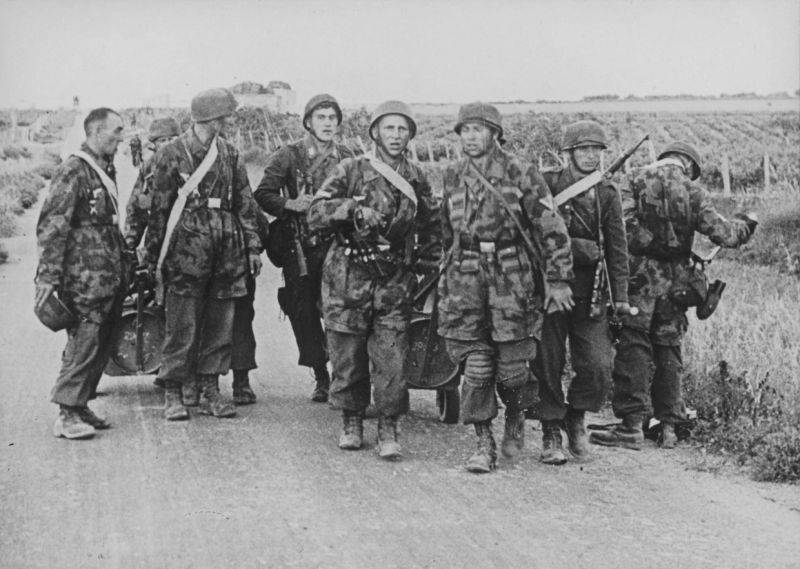
German paratroopers carry containers (Fallschirmjäger Abwurfbehälter) of equipment along the road in Crete. For ease of transportation by land, these containers were equipped with special wheels and handles.
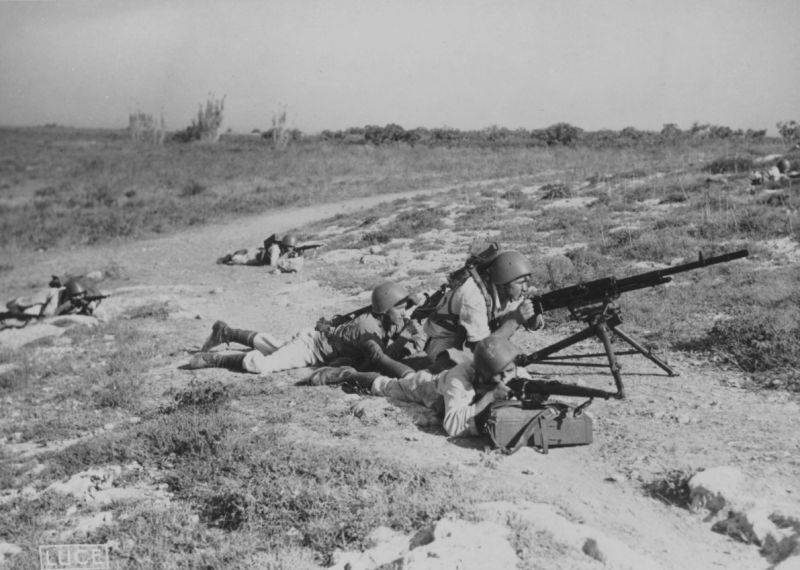
Italian Marines at the 8mm Breda M37 machine gun after landing at Sitia, Crete
The Germans are developing an offensive
At night, the command sent a messenger, he correctly assessed the situation and reported to the headquarters. The Germans decided to take the risk and continue the operation, throw all available forces to storm the airport in Maleme. On the morning of May 21, 1941, the Germans landed an anti-tank battalion of the parachute division and another battalion formed from the remaining divisions of the division. With the help of these reinforcements and aviation support, the Germans took Maleme by storm during the day and were able to clear the airfield area of the enemy. At noon, the first mountain riflemen were dropped off there. This decided the outcome of the operation.
The complete supremacy of the Luftwaffe in the air made it possible in the following days to transfer new units of the mountain rifle division. They cleared the area around the airfield with a radius of up to 3,5 km from the stubbornly resisting New Zealanders. The Nazis created a stable foothold for the invasion.
At the same time, the Germans prepared a naval operation, transferred a transport fleet of numerous ships and boats from the port of Piraeus to the island of Milos, which is located 120 km from Crete. These ships, which did not have air cover, were attacked by British ships on 22 May. Most of the transports with heavy weapons were sunk. Only a few ships reached Crete. But on May 23, the British fleet also suffered serious losses from the actions of the German air force. Two cruisers and two destroyers were killed, two cruisers and a battleship were damaged. The command considered that these were too high losses. The British fleet leaves for Alexandria.
Now the Germans could safely carry reinforcements, weapons and ammunition by sea. The forces deployed by aircraft at Maleme were sufficient to launch a decisive offensive. By May 27, German troops captured Chania, all the strategic points of the island and the western part of Crete. On May 28, an Italian landing was landed on the eastern part of the island. On the same day, the shock detachment, which included a motorcycle and rifle battalion, a reconnaissance battalion of mountain riflemen, artillery and several tanks, launched an offensive from the western part of the island to the east. On May 29-30, the strike group linked up with the units landed in the Rethymnon area, and then with the Italians.
Allied resistance was broken. Already on May 26, 1941, the commander of the allies, General Freiberg, reported that the situation on the island was hopeless. The soldiers were demoralized by enemy air raids that continued for several days. Troop losses grew, air defense systems were scarce, as well as artillery. On May 27, the high command authorized the evacuation. The ships of the Alexandria squadron again went to Crete.
May 28 - June 1, the British fleet evacuated part of the allied grouping (about 15 thousand people) from the Heraklion area in the north of the island and the Sfakia bay, on the southern coast. Then the British, in order to avoid further losses, refused to continue the evacuation. The British fleet lost several ships during the evacuation.
The last centers of resistance were suppressed by the Germans on June 1.
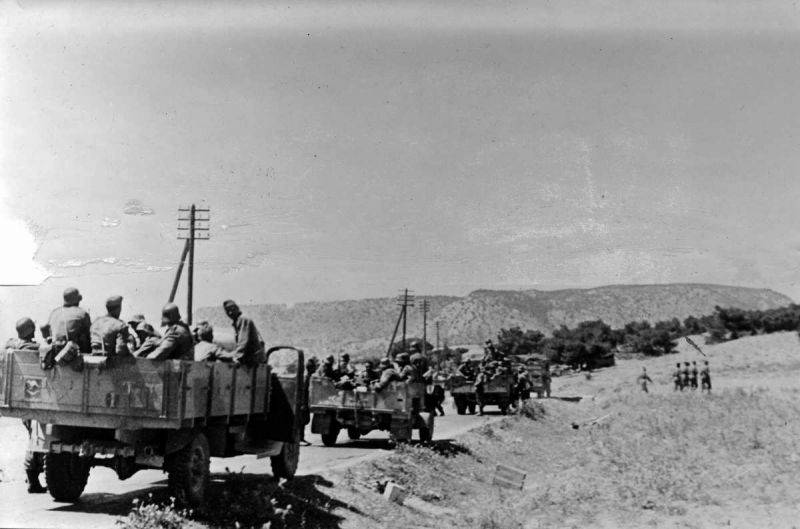
German soldiers in captured British trucks in Crete
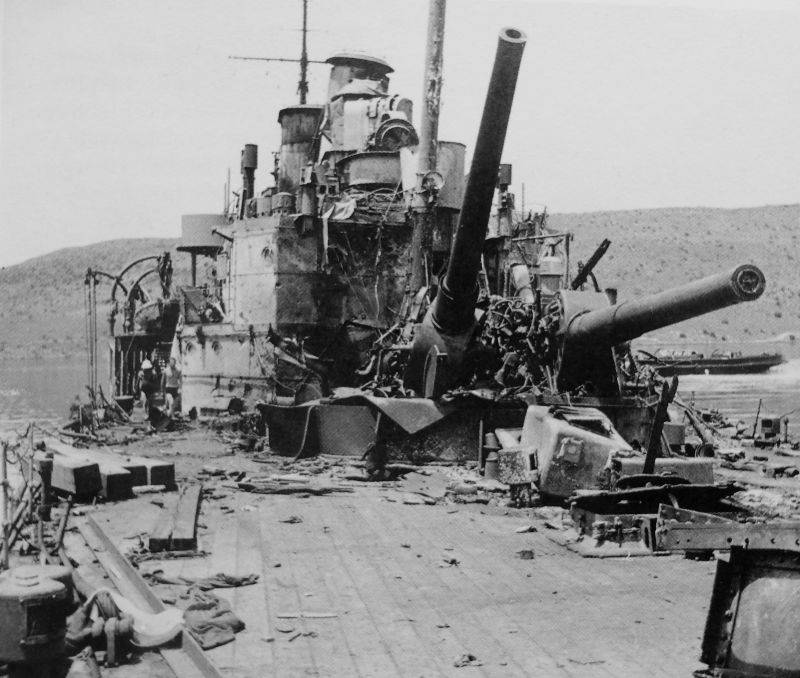
The destroyed gun turrets of the British heavy cruiser York. 25.03.1941/10/XNUMX the cruiser was blown up in the Souda bay near Crete by the boats of the Italian XNUMXth MAS flotilla filled with explosives. "York" was planted on the seabed off the coast of the island and during the following time was used to repel German air raids, while receiving bombs. After the start of the landing operation of the German troops in Crete, an order was given to blow up the gun turrets of the cruiser
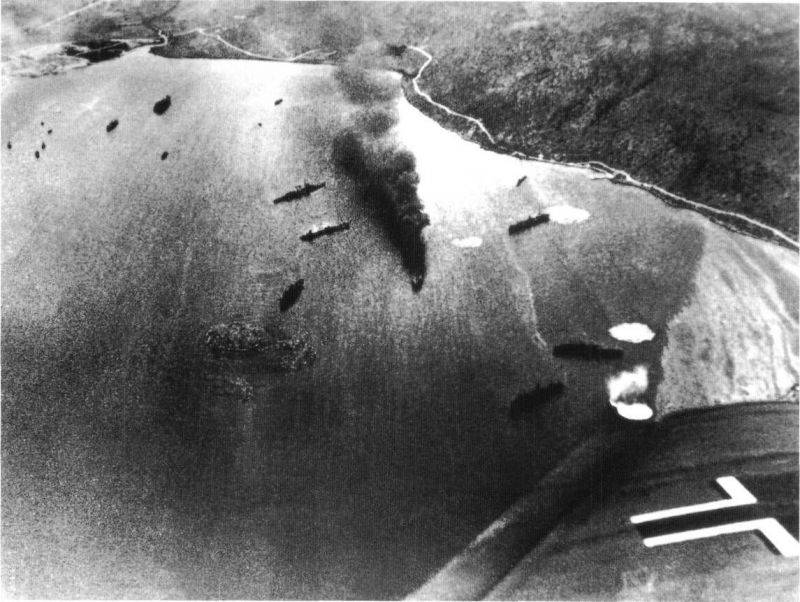
German Junkers Ju 87 dive bombers attack British ships at a Greek naval base in Souda Bay, Crete. The photo was taken from a German plane. Although the British Mediterranean Navy destroyed or scattered the German amphibious assault on Crete, they then lost three cruisers and six destroyers to Luftwaffe air strikes. Other ships were badly damaged
Results
Thus, the Germans conducted one of the largest airborne operations of the Second World War.
The airborne assault forces captured the most important points of the island, and the complete dominance of the Germans in the air played an important role in the victory. The Germans lost about 7 thousand dead, missing and wounded. The Luftwaffe lost 147 aircraft downed and 73 as a result of accidents (mainly transport). Allied losses - over 6,5 thousand dead and wounded, 17 thousand prisoners. Losses of the British fleet (from the actions of German aviation): three cruisers, six destroyers, more than 20 auxiliary ships and transports. Three battleships, an aircraft carrier, six cruisers, and 7 destroyers were also damaged. About 2 thousand people died.
The losses of the Airborne Forces made such a depressing impression on Hitler that he forbade such operations in the future. The Maltese operation was finally abandoned.
However, no matter how expensive the operation to capture Crete was, strategically it justified itself. Operations by the British fleet in the Mediterranean were further constrained. The oil regions of Romania are protected. Crete, together with Rhodes, occupied by the Italians, formed a convenient base for further operations of the Reich in the Mediterranean.
It was logical to build on the success, to carry out the Maltese operation. Then to land a strike force in Syria and Lebanon, from there to launch an offensive in Iraq, restoring a friendly regime there, and in Palestine. Counter strikes from Libya and Syria to crush the enemy in Egypt. Further, it was possible to take control of the entire Near and Middle East. Threaten British India. This put Britain on the brink of defeat.
However, Hitler adhered unwaveringly to his plans to attack Russia. And the operation in the Balkans was just an unpleasant delay for him. As a result, the opportunities opened up by the capture of Greece and Crete were not used, as were the first successes of Rommel in North Africa.
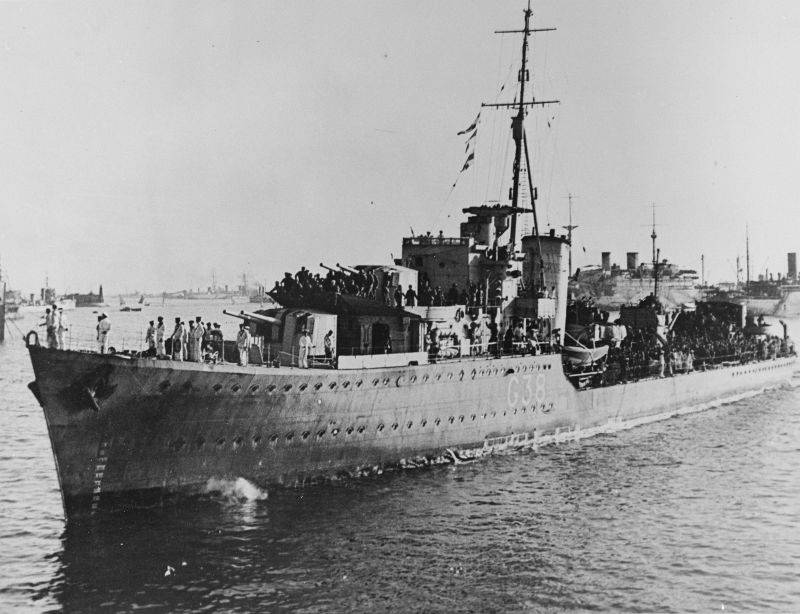
Australian destroyer HMAS Nizam enters the port of Alexandria with allied soldiers evacuated from Crete
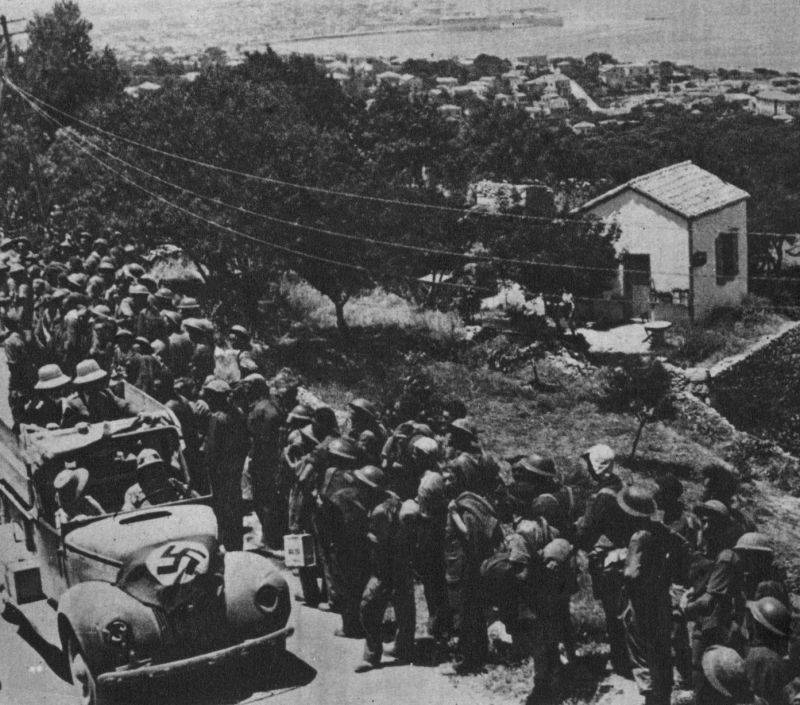
A German truck drives past a column of British prisoners of war in Crete
- Alexander Samsonov
- http://waralbum.ru/
Information